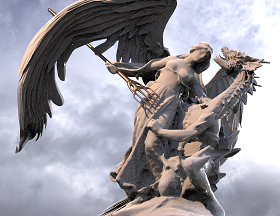This is Faith in Play #83: Spirits, for October 2024.
In my book Why I Believe I note that if there is a supernatural realm in which God exists, it is at least likely that there are other spirits existing in that realm. Further, those spirits might be at least as varied as living organisms on Earth, and some might be of a sort that could reasonably claim the title “god”.

That of course leads to the question of why we worship one particular God to the exclusion of all others. Part of my reasoning there is that it is very difficult for us to know what spirits we can trust. Spirits might have motivations for their actions that are entirely selfish–what we call evil. Of course, it’s entirely possible that some of those spirits might be benevolent, good–but the question is, how are we to know?
So as we face the possibility that there might be spirits out there apart from God, we face the problem of knowing which ones we can trust. After all, Paul himself tells us that Satan can disguise himself as an angel of light. We are ill-equipped to know what spirits can be trusted.
It is important to recognize that our God has gone out of His way to demonstrate that we can trust Him. No other spirit has similar credentials.
People try to manipulate spirits in many ways, and I’ve written before about a game in which characters make deals with devils to get what they want. Yet in this I wonder whether those trying to make the deals have the power they think they have. Draw a pentagram, or a thaumaturgic circle, or whatever symbol you believe will contain the demon, then summon it. It stays in the designated space–but is it there because it is trapped, or because it wants you to believe it is trapped? When you pronounce your spells of punishment and it howls, is that pain, or is it acting? It might all be a ruse to lure you into thinking you have control, when it is in control the entire time.
We have reason to believe that demons can control people, possess them, seemingly get inside them and direct their actions. Some people claim to have been possessed, and some have claimed to have performed exorcisms. The authenticity of such claims might be debated, but they are bolstered by the fact that we have them in the New Testament. Whatever sense we make of them, those who believe the New Testament to be true must accept that demons are real.
On the positive side, though, we also must accept that angels are real, that there are good spirits working for our benefit, just as their are evil spirits who would harm us. Again, though, recognizing whether any specific spirit is good or evil, angel or demon, is not something we can reliably do. And in such a situation it is better to err on the side of caution.
I have never, to the best of my knowledge, encountered a spirit, demonic or angelic, nor an individual possessed by one; I have neither performed nor witnessed an exorcism. I believe these things are real, but hope never to have empirical proof. I would hope the same for you. These are not matters for trifling.
At the same time, I wonder about including them in games. If you read these articles, you can guess correctly that I am not against the inclusion of imaginary demons in fiction and games. Obviously, too, I am aware of games in which they are included, games in which they are adversaries, or monsters, or even characters on opposing sides. I have elsewhere argued that in its early forms, at least, Dungeons & Dragons was a near perfect metaphor for spiritual warfare.
I believe in spiritual warfare. At a Bible study once, E. R. Jones (my partner in creating Multiverser) was asked how he would define the Christian faith in one word, and he answered, “War”. We are in a fight against the devil for the souls of men.
There are many ways to portray that in games. I applaud efforts to do so.
